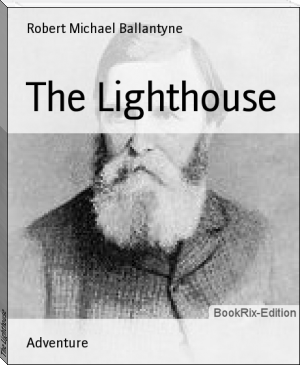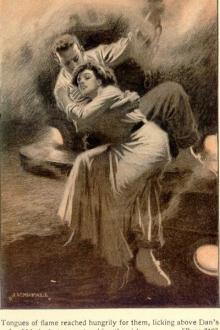The Lighthouse, Robert Michael Ballantyne [summer reading list .txt] 📗

- Author: Robert Michael Ballantyne
Book online «The Lighthouse, Robert Michael Ballantyne [summer reading list .txt] 📗». Author Robert Michael Ballantyne
Advancing stealthily to the door, they tried it and found it locked. The windows were all carefully bolted, and the shutters barred. This they expected, but thought it as well to try each possible point of entrance, in the hope of finding an unguarded spot before having recourse to their tools. Such a point was soon found, in the shape of a small window, opening into a sort of scullery at the back of the house. It had been left open by accident. An entrance was easily effected by the Badger, who was a small man, and who went through the house with the silence of a cat, towards the front door. There were two lobbies, an inner and an outer, separated from each other by a glass door. Cautiously opening both doors, the Badger admitted his comrade, and then they set to work.
A lantern, which could be uncovered or concealed in a moment, enabled them to see their way.
"That's the dinin'-room door," whispered the Badger.
"Hist! haud yer jaw," muttered Swankie; "I ken that as weel as you."
Opening the door, they entered and found the plate-chest under the sideboard.
It was open, and a grin of triumph crossed the sweet countenances of the friends as they exchanged glances, and began to put silver forks and spoons by the dozen into a bag which they had brought for the purpose.
When they had emptied the plate-chest, they carried the bag into the garden, and, climbing over the wall, deposited it outside. Then they returned for more.
Now, old Mrs Stewart was an invalid, and was in the habit of taking a little weak wine and water before retiring to rest at night. It chanced that the bottle containing the port wine had been left on the sideboard, a fact which was soon discovered by Swankie, who put the bottle to his mouth, and took a long pull.
"What is't?" enquired the Badger, in a low tone.
"Prime!" replied Swankie, handing over the bottle, and wiping his mouth with the cuff of his coat.
The Badger put the bottle to his mouth, but unfortunately for him, part of the liquid went down the "wrong throat". The result was that the poor man coughed, once, rather loudly. Swankie, frowning fiercely, and shaking his fist, looked at him in horror; and well he might, for the Badger became first red and then purple in the face, and seemed as if he were about to burst with his efforts to keep down the cough. It came, however, three times, in spite of him,--not violently, but with sufficient noise to alarm them, and cause them to listen for five minutes intently ere they ventured to go on with their work, in the belief that no one had been disturbed.
But Major Stewart had been awakened by the first cough. He was a soldier who had seen much service, and who slept lightly. He raised himself in his bed, and listened intently on hearing the first cough. The second cough caused him to spring up and pull on his trousers; the third cough found him halfway downstairs, with a boot-jack in his hand, and when the burglars resumed work he was peeping at them through the half-open door.
Both men were stooping over the plate-chest, the Badger with his back to the door, Swankie with his head towards it. The major raised the boot-jack and took aim. At the same moment the door squeaked, Big Swankie looked up hastily, and, in technical phraseology, "doused the glim." All was dark in an instant, but the boot-jack sped on its way notwithstanding. The burglars were accustomed to fighting, however, and dipped their heads. The boot-jack whizzed past, and smashed the pier-glass on the mantelpiece to a thousand atoms. Major Stewart being expert in all the devices of warfare, knew what to expect, and drew aside. He was not a moment too soon, for the dark lantern flew through the doorway, hit the opposite wall, and fell with a loud clatter on the stone floor of the lobby. The Badger followed at once, and received a random blow from the major that hurled him head over heels after the lantern.
There was no mistaking the heavy tread and rush of Big Swankie as he made for the door. Major Stewart put out his foot, and the burglar naturally tripped over it; before he could rise the major had him by the throat. There was a long, fierce struggle, both being powerful men; at last Swankie was hurled completely through the glass door. In the fall he disengaged himself from the major, and, leaping up, made for the garden wall, over which he succeeded in clambering before the latter could seize him. Thus both burglars escaped, and Major Stewart returned to the house half-naked,--his shirt having been torn off his back,--and bleeding freely from cuts caused by the glass door.
Just as he re-entered the house, the old cook, under the impression that the cat had got into the pantry, and was smashing the crockery, entered the lobby in her nightdress, shrieked "Mercy on us!" on beholding the major, and fainted dead away.
Major Stewart was too much annoyed at having failed to capture the burglars to take any notice of her. He relocked the door, and assuring his mother that it was only robbers, and that they had been beaten off, retired to his room, washed and dressed his wounds, and went to bed.
Meanwhile Big Swankie and the Badger, laden with silver, made for the shore, where they hid their treasure in a hole.
"I'll tell 'ee a dodge," said the Badger.
"What may that be?" enquired Swankie.
"You said ye saw Ruby Brand slinking down the market-gate, and that's he's off to sea?"
"Ay, and twa or three more folk saw him as weel as me."
"Weel, let's tak' up a siller spoon, or somethin', an' put it in the auld wife's garden, an' they'll think it was him that did it."
"No' that bad!" said Swankie, with a chuckle.
A silver fork and a pair of sugar-tongs bearing old Mrs Stewart's initials were accordingly selected for this purpose, and placed in the little garden in the front of Widow Brand's cottage.
Here they were found in the morning by Captain Ogilvy, who examined them for at least half-an-hour in a state of the utmost perplexity. While he was thus engaged one of the detectives of the town happened to pass, apparently in some haste.
"Hallo! shipmate," shouted the captain.
"Well?" responded the detective.
"Did ye ever see silver forks an' sugar-tongs growin' in a garden before?"
"Eh?" exclaimed the other, entering the garden hastily; "let me see. Oho! this may throw some light on the matter. Did you find them here?"
"Ay, on this very spot."
"Hum. Ruby went away last night, I believe?"
"He did."
"Some time after midnight?" enquired the detective.
"Likely enough," said the captain, "but my chronometer ain't quite so reg'lar since we left the sea; it might ha' bin more,--mayhap less."
"Just so. You saw him off?"
"Ay; but you seem more than or'nar inquisitive to-day--"
"Did he carry a bundle?" interrupted the detective.
"Ay, no doubt."
"A large one?"
"Ay, a goodish big 'un."
"Do you know what was in it?" enquired the detective, with a knowing look.
"I do, for I packed it," replied the captain; "his kit was in it."
"Nothing more?"
"Nothin' as I knows of."
"Well, I'll take these with me just now," said the officer, placing the fork and sugar-tongs in his pocket. "I'm afraid, old man, that your nephew has been up to mischief before he went away. A burglary was committed in the town last night, and this is some of the plate. You'll hear more about it before long, I dare say. Good day to ye."
So saying, the detective walked quickly away, and left the captain in the centre of the garden staring vacantly before him in speechless amazement.
CHAPTER FIVE.
THE BELL ROCK INVADED.
A year passed away. Nothing more was heard of Ruby Brand, and the burglary was believed to be one of those mysteries which are destined never to be solved.
About this time great attention was being given by Government to the subject of lighthouses. The terrible number of wrecks that had taken place had made a deep impression on the public mind. The position and dangerous character of the Bell Rock, in particular, had been for a long time the subject of much discussion, and various unsuccessful attempts had been made to erect a beacon of some sort thereon.
There is a legend that in days of old one of the abbots of the neighbouring monastery of Aberbrothoc erected a bell on the Inchcape Rock, which was tolled in rough weather by the action of the waves on a float attached to the tongue, and thus mariners were warned at night and in foggy weather of their approach to the rock, the great danger of which consists in its being a sunken reef, lying twelve miles from the nearest land, and exactly in the course of vessels making for the firths of Forth and Tay. The legend further tells how that a Danish pirate, named Ralph the Rover, in a mischievous mood, cut the bell away, and that, years afterwards, he obtained his appropriate reward by being wrecked on the Bell Rock, when returning from a long cruise laden with booty.
Whether this be true or not is an open question, but certain it is that no beacon of any kind was erected on this rock until the beginning of the nineteenth century, after a great storm in 1799 had stirred the public mind, and set springs in motion, which from that time forward have never ceased to operate.
Many and disastrous were the shipwrecks that occurred during the storm referred to, which continued, with little intermission, for three days. Great numbers of ships were driven from their moorings in the Downs and Yarmouth Roads; and these, together with all vessels navigating the German Ocean at that time, were drifted upon the east coast of Scotland.
It may not, perhaps, be generally known that there are only three great inlets or estuaries to which the mariner steers when overtaken by easterly storms in the North Sea--namely, the Humber, and the firths of Forth and Moray. The mouth of the Thames is too much encumbered by sand-banks to be approached at night or during bad weather. The Humber is also considerably obstructed in this way, so that the Roads of Leith, in the Firth of Forth, and those of Cromarty, in the Moray Firth, are the chief places of resort in easterly gales. But both of these had their special risks.
On the one hand, there was the danger of mistaking the Dornoch Firth for the Moray, as it lies only a short way to the north of the latter; and, in the case of the Firth of Forth, there was the terrible Bell Rock.
Now, during the storm of which we write, the fear of those two dangers was so strong upon seamen





Comments (0)